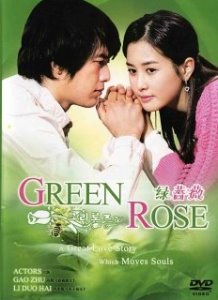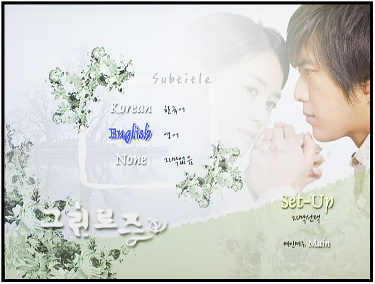Green Rose
Directed by Kim Soo Ryong & Kim Jin Geun
Written by Yoo Hyeon Mi & Kim Doo Sam
Originally aired on SBS Television
March 19 – May 29, 2005
|
|
Episodes 1-28 available HERE: Thinking of buying from YesAsia? CLICK HERE and use THIS UPDATED BEAVER PAGE to source their very best... |
|
Cast:
Go Soo as Lee Jung-hyun/Jang Joong-won
Lee Da Hae as Oh Soo-ah
Lee Jong Hyuk as Shin Hyun-tae
Kim Suh Hyung as Cha Yoo-ran
Sun Woo Jae Duk as Suh Jun-moo
Jung Sang Hoon as Kim Dong-wook
Zhang Kang'er as Chen Daren
Review by Leonard Norwitz
Studio:
Production: SBS (Korea)
Video: SBS Productions (Korea)
Video:
Aspect ratio: 4:3
Region 3: NTSC
Feature: 480i
Supplements: 480i
Audio:
Korean DD2.0
Subtitles:
Feature: English, Korean
Extras: none
Extras:
Interviews & TV appearances by the cast
Presentation
22 episodes, approx. 60 min. per episode
Extra features: 67 minutes
1 box set with 2 volumes, complete on 8 discs
Release Date: August 16, 2005
Also Available HERE
Green Rose ~ Comment : The Plausibility Factor
(see Introduction to Korean Drama HERE)
further ref: TWITCH FILM HERE
Just because a dramatic television series averages a 27% share over its 11 week, 22 episode run doesn't mean that I would not hold it to the same standard as a serious motion picture from the West or the East. Popularity is no guarantor of excellence, but neither is it a critical kiss of death. With Western audiences, the difficulty with some Korean television dramas is their often careless attitude about credibility. I don't mean that the plots aren't credible: I'm wiling to grant fiction its due. I don't care that someone comes back from the dead in the body of another person, or that siblings separated at birth meet romantically as adults. I do care when a situation plays out in a way that makes us question its credibility: When I find myself screaming, "No one would do that!" I know we're in trouble. Over time, I have come to accept a certain convention in Korean TV dramas, but Green Rose stretches all sense of proportion and plausibility right from the outset, and does so repeatedly through the first third of its 22 episodes.
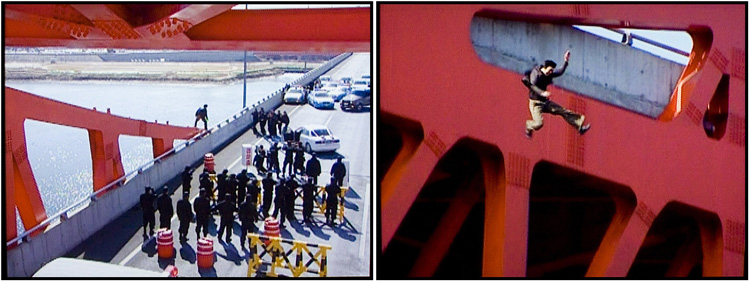 |
Which leads me the basic question: Why are Korean Dramas so addictive, often despite the credibility gap? For that matter, why are shows like 24 and Lost so addictive? There are a number of reasons, among them being the passionate performances of their actors. These are characters who sincerely believe in their circumstances, no matter how implausible. Add to this: the attractiveness of the stars and the often surprising cliffhangers that manipulate us into wanting to “see how it comes out. We get sucked in time and again, often against our better judgment. An irresistible force has collided with a ready-made gullible object.
Any chance of success for Green Rose lies with Go Soo, the actor that plays the hapless Lee Jung-hyun and his reborn alter ego, Jang Joong-won, since he is at the center of both the thriller and the love story. The choice of Go Soo, as is just about everyone in the cast, is spot on. This young, charismatic actor is able to convey a huge range of emotional states as his character is driven from pillar to post in the first part of the series and, with the authority of wealth and confidence behind him, as he slowly puts together the pieces of the puzzle in the second.
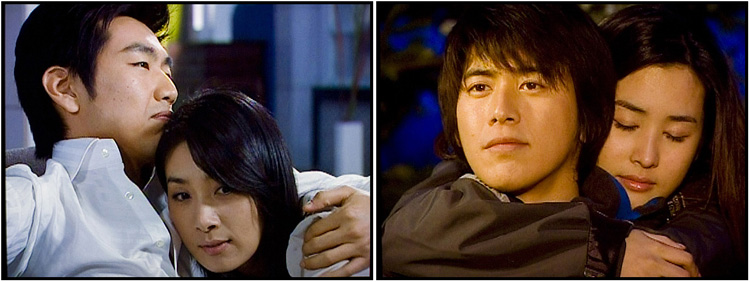 |
Kim Suh Hyung as Cha Yoo-ran is another good reason to watch the series. Yoo-ran is reminiscent of Young-mi in All About Eve: ambitious, ruthless, yet utterly self-destructive. (Kim So-Yeon has the advantage of a more fully developed, more intriguing character and may be the better actress of the two.) Better still is Lee Jong Hyuk as Shin Hyun-tae, the person we are led to believe is behind the frame up and attempted murder. Lee conveys just the right mix of ruthless disdain for his adversary and seductive charm. His character never persuades the long suffering heroine, played by the exceedingly good looking Lee Da Hae, to denounce her boyfriend, which is how it should be. Her character, Oh Soo-ah, is given little else to do besides suffer, and her default tearful responses to just about every stress gets tiresome, but I didn't think it was the fault of the actress.
Green Rose has a quasi-Fugitive premise: a wrongly accused and framed good man, convicted to life imprisonment, escapes in order to unmask the true culprit and prove his innocence. Green Rose adds typically Korean layers of a "first love" story and the usual lying to loved ones – though in this case, our hero is clear that his deceit is not just to save his former girlfriend from pain, but so that he will not have to suffer watching her suffer. Either way, it seems that the Korean men in many of these TV dramas don't think very highly of the inner strength of their women and much too highly of martyrdom.
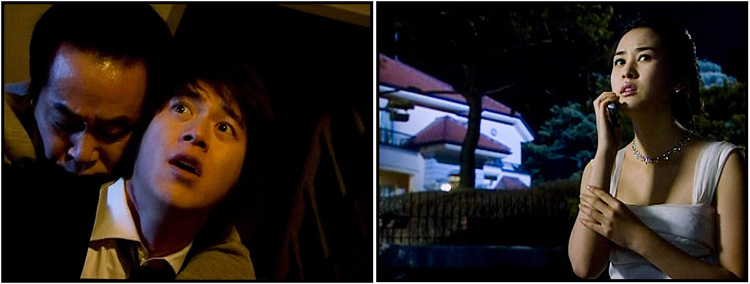 |
It's possible that people who find 24 entertaining would like this show since the protagonists are charismatic, intense and sincere. But you have be willing to suspend a whole lot of disbelief to accept the logic of the situations as they unfold here. As I did with 24, about every five minutes I find myself screaming at the screen that this makes no sense or offends the intelligence of a artichoke. For example, the way Jung-hyun is framed couldn't have convinced a 19th century Southern jury that a black man raped a white girl: A phone call brings him to the home of the father of his girlfriend where he finds said father near death. Just then the house catches fire. As Jung-hyun attempts to drag the man from the house, an unseen assailant strikes him unconscious. And as the fire rages about them, we see the perpetrator applying Jung-hyun's fingerprints to a presumed murder weapon, the phone and the can of fuel that started the fire, which the perpetrator tosses outside far from the house.
The jury is expected to believe that Jung-hyun went to the house to murder the man so he could marry his daughter without his interference. Jung-hyun was supposed to have gone there - by cab, no less - beat his victim and then struck himself unconscious (for that is how the ambulance team found him), but not before dragging his victim out of the house after he came to, and still have enough wherewithal to toss the fuel can out of the house 70-80 yards away. This is so preposterous it should make the viewer and the jury vomit - but, heaping insult on top of insult, no one talks to the cab driver nor investigates how Jung-hyun brought the fuel can to the house in the first place. And why go to the trouble of applying the fingerprints, which miraculously survived the blaze, if the perpetrator was going to burn the house down? Was the frame a back up plan or did he rely on the fire department's coming in the nick of time AND that Jung-hyun would have escaped the fire in order to be framed? If the person you are trying to frame is killed at the same time, the finger points at a different perpetrator! End of framing! End of drama!
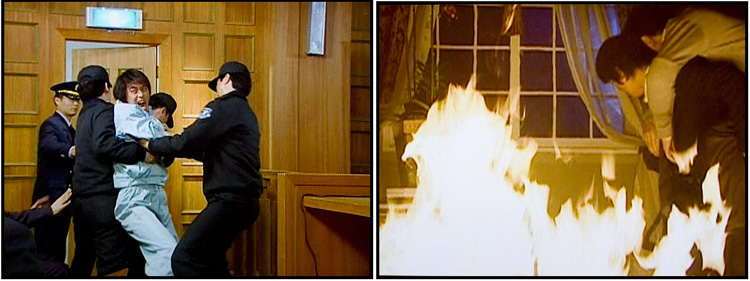 |
And how does Jung-hyun escape prison: He is taken to his mother's funeral in a van without guards to speak of and without handcuffs or leg irons. But when in prison he was required to be handcuffed when someone came to visit him despite the fact that he was the only one in the visitor's room and a glass wall separated him from the visitor – and he was in prison. There simply is no attempt at logical or believable constructs - in this, it is much like 24 - which, as you know, is a very popular show despite its absurdity.
One other strange thing about this show – or, at least, this edition – is that some parts of some frames were deliberately blurred out, evidently to protect privacy: certain phone numbers (as seen on a cell phone read-out, license plate, or credit card). Stranger still was that the director went to some trouble to camouflage brandished knives. A couple of times we see someone with what we assume is a knife at someone's throat, except that it is wrapped in newspaper. What can I say!
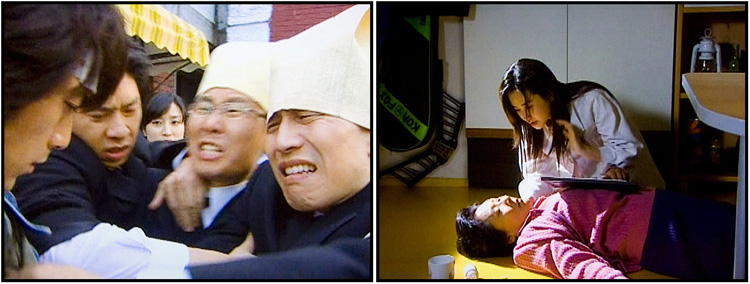 |
Once I decided I was going to finish watching the entire series – which, by the way, became much more plausible after the first six or seven episodes, I began to research some background for this review, and I learned that Green Rose was originally slated for the usual 16 episodes, but due to its early popularity was expanded to 22. And it shows. Flashbacks are overused and sidebars are expanded, ruining the tension previously created.
BTW, I liked the fact that some of the dialog was in Chinese. It made for a diverting international flavor and gave the Korean actors something to sink their verbal teeth into.
Green Rose
The Score Card
The Series : 5
Lee Jung-hyun, a low level employee at a major electronics company, is accused and convicted of the attempted murder of his girlfriend’s father, who happens to be the CEO of the company. Jung-hyun wallows in jail for a time before making good his escape out of the country. On the trail of Cha Yoo-ran, the woman whose perjured testimony convicted him, he arrives in Shanghai, penniless and unable to understand the language or its customs. As luck would have it, he rescues a wealthy business mogul who takes him in and, under whose guidance, Jung-hyun becomes Jang Joong-won, his most trusted aide. Three years later, as president of Dairyook, Joong-won leads a small contingent back to Korea, ostensibly to choose a company to join forces with, but more importantly to unravel the mystery of his frame-up.
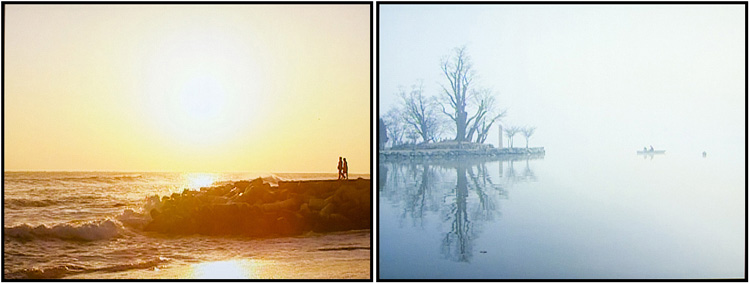 |
Edition: 9
At this point, this set from SBS Productions is the only edition with English subtitles. I gather that YAE is considering the series, but there are no definite plans.
Image : 6.5 (6<7/8)
The score of 6.5 indicates a relative level of excellence compared to other standard definition DVDs on a 10-point scale for SD DVDs. The score in parentheses represents: first, a value for the image on a 10-point scale that accommodates both standard and high-definition DVDs – where any score above 7 for an SD is outstanding, since the large majority of high definition DVDs are 8-9.5. The second number in parentheses indicates how that image compares to what we might have seen as first shown on television, in this case, standard definition.
Jpeg artifacts abound, especially in the first few discs, as well as variations in contrast from scene to scene with no apparent attempt to impose a particular color or tone to the series. This is common with Korean on-location filming for television series. Otherwise the image is reasonably sharp.
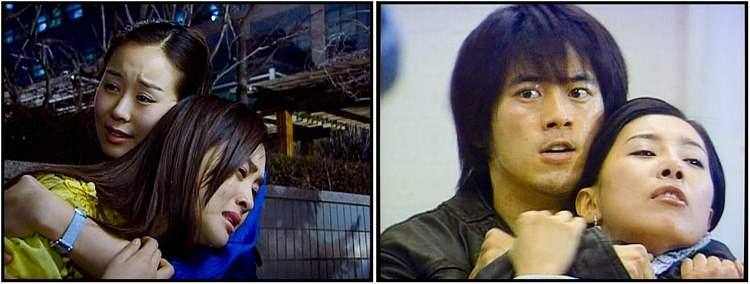 |
Audio & Music : 8/5
This is the first Korean series I've come across for whose music score I cannot give high marks. It feels very off-the-shelf and, for the first several and final episodes, is played with no variation to speak of when a particular motif is called for. Hearing the same music played the same way every time there is a montage of people walking with determination is another example of how little attention was paid to production values.
Translation & Subtitles : 7
My experience with English subtitles provided by Korean DVD studios is that they are not nearly as weak as for Chinese TV dramas, but also not as good as for Korean or Chinese feature films. I'm not sure why that it, but it is definitely the case. The SBS subtitles here are better than adequate. I never got lost nor was I confused for longer than a few seconds. The translations were satisfactorily idiomatic, but not nearly as good as the best work from YA-Entertainment.
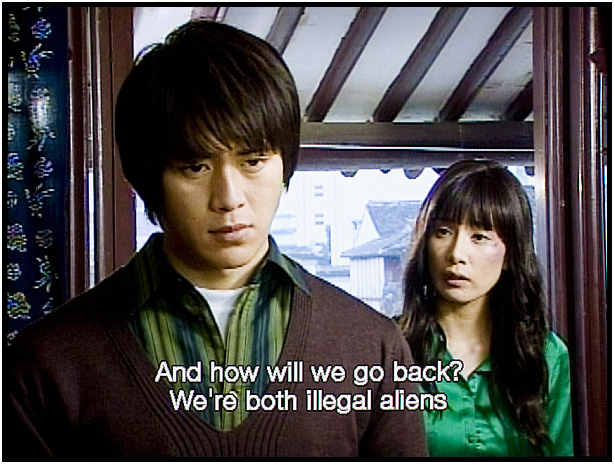 |
Operations & Box Design : 8
The outer box has a pleasing, satin finish. The inner volumes slip out easily and the discs are readily accessed. Menu functions are simple and straightforward, but I took off a point for an interminably long pre-menu introduction that cannot be bypassed or fast-forwarded.
Extras : 6
I watched most of this despite the absence of subtitles. The fan-targeted spots were a welcome contrast to the series' intense seriousness.
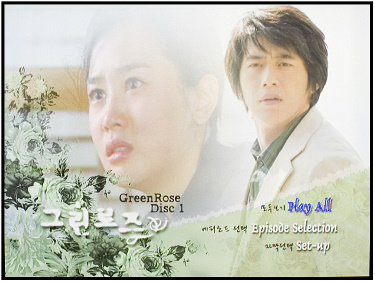 |
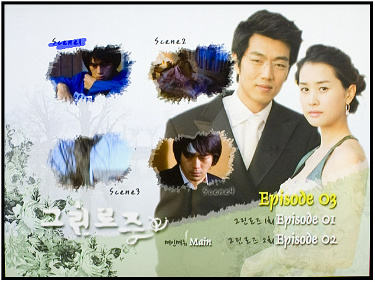 |
|
|
|
Recommendation: 5
Despite the series popularity in Korea and with at least two other reviewers, I found this series to be trying at too many levels.
Leonard Norwitz
LensViews
February 7th, 2008
|
|
Episodes 1-28 available HERE: Thinking of buying from YesAsia? CLICK HERE and use THIS UPDATED BEAVER PAGE to source their very best... |

